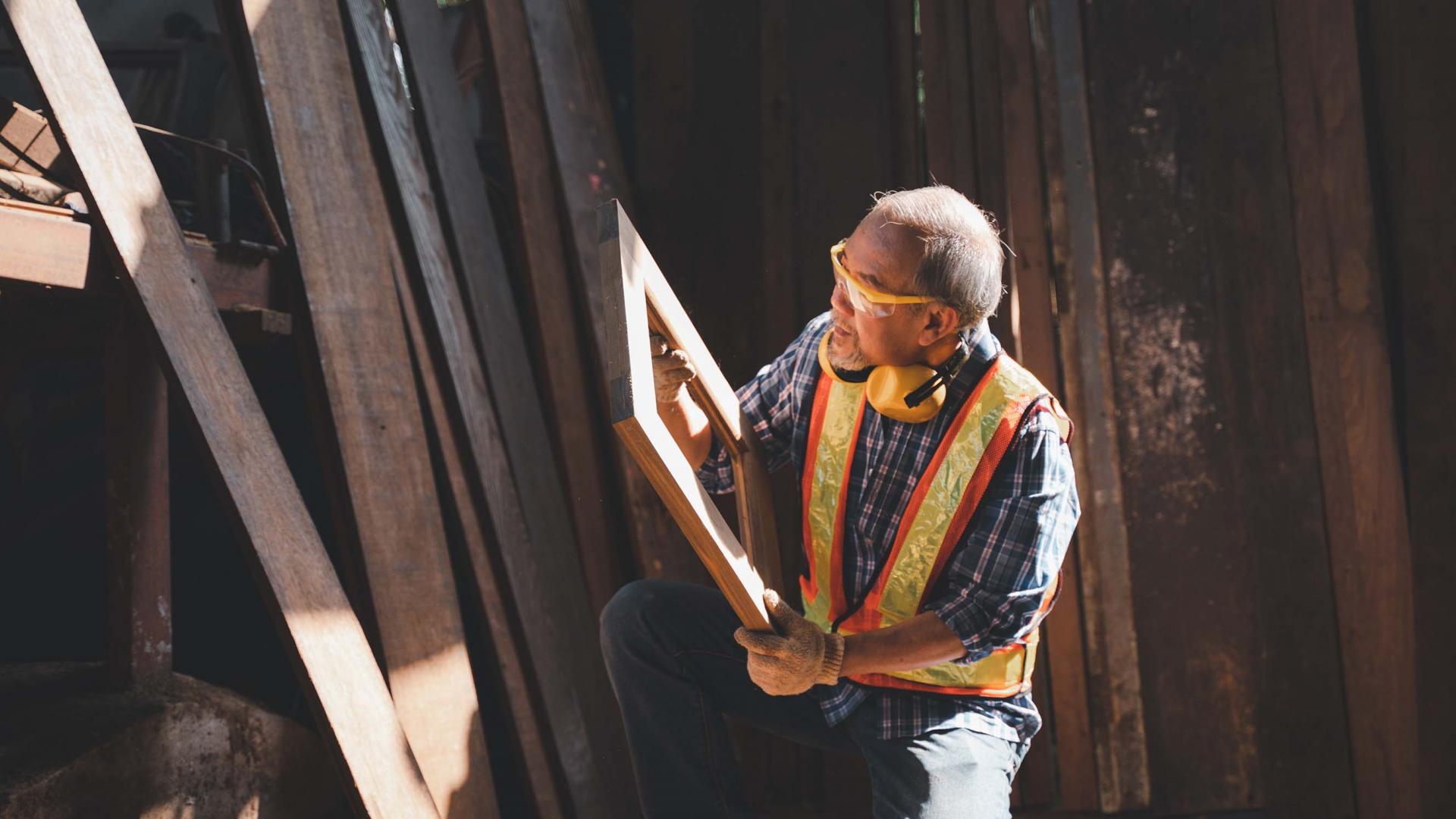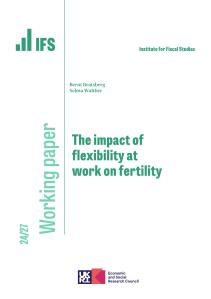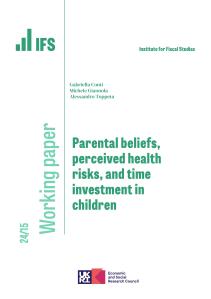
We look at the latest research on older workers and their participation in the labour market.
Paul Johnson
Hello and welcome to this edition of The IFS Zooms In, I'm Paul Johnson, Director of the IFS, and today we're going to be talking about older workers and their participation in the workforce. As you've probably heard, the numbers of people in work in the UK has been going down, or certainly not up anywhere near as fast as we've been used to over recent years, since the pandemic, and quite a lot of that has to do with reduced participation among older workers. And to discuss that, to help us understand what's going on, I'm joined by Jonathan Crib and Bea Boileau, who are both colleagues of mine here at the IFS, and who have written on this subject a couple of times already this year.
So, let's start Bea just by taking us through what's actually been happening to levels of employment or levels of economic activity to be slightly more precise of older workers over the last few years.
Beatrice Boileau
So, as you said Paul, we've seen the fall and the employment rates of older workers during the pandemic, and this doesn't seem to have been risen by a rise in unemployment to offset this. Instead, what we've seen is a rise in the rates of economic inactivity among older workers, so that's the state of neither being in work nor actively looking for work. And the proportional increase that workers in their fifties and sixties have seen during the pandemic has been much more significant than that which we've seen for other age groups.
Paul Johnson
So, we've got - you've distinguished economic activity from unemployment, so this isn't that older workers have been chucked out of a job, on unemployment benefit and looking for more work, they've either retired or they're sick, or for some other reason they've left work, but they're not looking for work?
Beatrice Boileau
No, there's some reason why they're not actively looking for work during this period. We do think that redundancies have played some role, especially in the early stages of the pandemic, but this hasn't seemed to prompt workers to move into unemployment. Instead, they've simply given up looking for work at.
Paul Johnson
All, and just to be clear, when we talk about older workers, what sort of - how much oldness are we talking about?
Beatrice Boileau
So, we're largely talking about workers in their fifties and in their early sixties, is what we referred to in our latest piece of work on this.
Paul Johnson
People like me, in other words, I'm afraid I'm still rather economically active.
Jonathan Cribb
And we're happy so.
Paul Johnson
Excellent, excellent, well done Jonathan, pay rise on the way. So, so we've seen a reduction, give a sense of the scale of that change. I mean, how many people have we lost from the labour market?
Beatrice Boileau
So, we see are almost 300,000 more economically inactive people in their fifties and their sixties compared to the period immediately before the pandemic.
Paul Johnson
So that's quite a significant change, 300,000 among that age group. And Jonathan how does that relate to what was happening pre pandemic? Because this isn't something that's been going on for a long time, is it? This is relatively new.
Jonathan Cribb
No, this is a reversal, I should say a partial reversal, of very long running trends now over recent decades of increasing participation of both men and women, but particularly women in the labour market in their fifties and sixties. We know something about why that's been happening. For women in particular, there are generation on generation increases of attachment to the labour market earlier in life, particularly surrounding the period in which women have dependent children. And those higher rates of participation earlier in life are kind of feeding through into higher rates of employment, kind of into the kind of fifty plus group, the older workers for one of a better.
Paul Johnson
So, women have been more in work whilst they've been having children in their thirties and forties and they've stayed in work later on?
Jonathan Cribb.
Exactly, that's one thing. Secondly, again, mainly on women, we've seen big increases in the state pension age, as recently as 2010 a woman could claim a state pension at age sixty. We're now at the point at which both men and women can only claim a state pension at age sixty-six, and that has continued to push up employment rates of women, in particular in their early sixties too. And there's also been some kind of, not related to either of those factors, gradual increases in employment for men, partly, actually it's a long running thing which is recovery from really low employment rates at these ages in the 1980s and 1990s. So really, there's been long running trends pushing up employment and we've got to this point, the pandemic, and we're seeing a partial reversal of that, and which is, you know, really, quite striking.
Paul Johnson
And that trend, I mean if we think about men, there's been a trend since about the mid 1990s, hasn't it, for increased employment? But still, for some of these groups, people in their early sixties and so on, it's still, even pre pandemic, participation was quite a lot lower than it was, for example in the early 1970s?
Jonathan Cribb
Yeah, that's absolutely true. You know, in the 1970s, most men worked until their state pension age.
Paul Johnson
Or they died, which was offered earlier, right?
Jonathan Cribb
Yes, but you know what they didn't do much was retired before their state pension age, and that's just not true anymore. It's a much more gradual process for in terms of kind of society wide and men retiring now.
Paul Johnson
And just before we go on to what's been happening post pandemic, broadly speaking, I think I'll be right in saying that the groups who are most likely to retire early, were those were quite well off, so they had a big pension, or plenty of wealth to live on, or those who are really not very well off at all and would move onto often incapacity benefits, or quite low levels of income pre state pension age.
Jonathan Cribb
Yes, that's absolutely right.
Paul Johnson
So, we have this long, well certainly for men, a sort of twenty-five year periods, shall we say, of increased labour force participation, for women a much longer period and really quite dramatic changes. We've now seen this sharp reversal not going up, but actually not even flattening, but coming down. So, we get to the question of why? What's changed? And this does seem to be very closely related to COVID - everything was going up until COVID and then post COVID it's going down. So, what do we know about why they're leaving Bea? There's been quite a lot of people suggesting this is being driven by increasing levels of ill health, is that is that what is that what we think?
Beatrice Boileau
So, I do want to start by saying that to some extent during the early points of the pandemic, this was driven by redundancies as a non-trivial number of older workers lost their jobs and re-employment rates were very low, many of those people moved into economic inactivity. But we now see you re-employment rates returning to their previous levels, and indeed even slightly above what they were immediately before the pandemic.
Paul Johnson
So just to be clear there, so you're saying during the pandemic, a lot of older people made redundant, and then essentially didn't go back into work?
Beatrice Boileau
Yes, exactly, that did play a not insignificant role.
Paul Johnson
But since the pandemic, those who are being made redundant are finding their way back into work, just as they would have done before?
Beatrice Boileau
Yes, yes exactly, and that doesn't seem to be any longer playing a significant role. Instead, there have been kind of two main hypotheses as to why the rate of economic inactivity has continued to rise among older workers, and these have been groups saying that this is largely driven by retirement, with more workers moving into early retirement. And then the idea that this is largely or wholly about health reasons, with more people being forced out of economic activity because they are, say, on NHS waiting lists, or because they're no longer healthy enough through long COVID to continue working.
And there's quite a lot of evidence which really points in both directions for this. So, we do see an increase in the rates of people who report being economically inactive for specific health reasons, people who are long term sick or disabled. But we think that rather than the overall increase in the rates of economic inactivity being driven by these people, we think that instead people are taking retirement and then at the same time the stock of people already inactive are becoming sicker.
Paul Johnson
So, this is a really interesting, slightly nerdy point, that actually quite a lot of people, as you say, have been saying they look at the data and there are more older people out of work, you're saying they're sick, than they used to be. So, it looks like what's happened is that more people are leaving work because they're sick. But actually, I think what you find when you actually follow people through time, is that the people who are moving out of work are not the people who are becoming sick, it's the people who are already out of work who are becoming sick. Is that broadly right?
Beatrice Boileau
Yes, exactly, so we're able to look at the longitudinal data, as you say, which follows the same people between quarters and we see that it seems to be an increase in the people moving directly from employment into retirement. That seems to be the thing that's increasing, rather than people moving directly from employment into being long term sick or disabled. And kind of further to that, the increase in the rate of inactivity seems to be driven by an increase in these inflows - because otherwise you might think that, say, inactive people are getting sicker, that's reducing the rate at which people move back out of inactivity. But we don't find that that's the case, instead it's going up because more people are moving from employment into inactivity, and that's being driven by movements directly into retirement.
And one thing that we find that backs this up using the cross-sectional data is that the rise in health related inactivity, which I referred to is - about 70% of that is being driven by people who've been out of work for at least five years, so as you say, this is among people who are long term inactive.
Paul Johnson
So that leaves us with, as it were two separate and quite different puzzles. One is why on Earth are these people who've been out of work for a long time getting sick more than they were? And the other is why are people moving out of work into retirement more than they previously were?
Beatrice Boileau
Yeah.
Paul Johnson
Do we have any answers to either of those questions?
Beatrice Boileau
Before thinking about answers, I do want to say one thing that we wanted to be careful with this work is not to imply that health isn't a problem when we're thinking about these. As you say, this kind of creates two problems for policymakers rather than just one, we don't want to downplay the importance of health reasons.
Paul Johnson
Absolutely, skipped that question brilliantly. Perhaps Jonathan can provide an answer?
Jonathan Cribb
I think we have, internally at least, have less good evidence on exactly why people are sicker. I mean, we know that there are significant numbers of people with long COVID, but my understanding is that the issues are not just about - health issues are not just about that. And we know that lots of people on NHS waiting lists, massively - a million more than before. But I feel in a way that's an almost - that question is almost another whole another podcast, why are people sicker. Where I think Bea and I, at least, can shed more light on, is why are people more likely to move into retirement than before? It's not cast iron, but we can look at the groups that are doing it. The groups that are more likely to be moving from employment into retirement at greater rates are in a sense those who were already somewhat closer to retirement. People are working part time, people in their sixties, people who are self-employed and so they've already got many more flexibility around their work. Other than that, it is quite broad based in terms of education, professional, nonprofessional, public, private sector. So, you know it seems that whatever has happened during the pandemic has taken a set of people who were a little bit less attached to labour force and kind of pushed them over into going for a slightly earlier retirement than they would have before.
Paul Johnson
And it's interesting you're saying it's not just those who've got big pensions, or it's not just those who were particularly poor, it's right across the distribution of income and wealth.
Jonathan Cribb
Yes, it's also across the country, for example, as well as income and wealth, we don't see any big regional differences in this happening.
Paul Johnson
So, it’s broad based change, I guess that leads me to three questions really, one is, does it matter? One is, is it going to keep going? And one is, are these people going to regret it? So, let's cover this question of does it matter? I mean if people are - this group of people who are retiring earlier, they're not sick, they're doing it entirely voluntarily, is that fine? Why is there any public policy issue here at all?
Jonathan Cribb
Well, to the extent that this is indeed about people kind of for want of a better word making a lifestyle choice, they've experienced the pandemic, they've decided that what's best for them is to leave work and rely upon, you know their combination of their private pension, savings, state pension, maybe some partners earnings. You might expect that it's, you know making these people better off relative to if they'd stayed on in work so you know, and that's a that's important that people are making decisions to make themselves better off. I think that at this particular point there is a concern which is we are at a point now with a significant inflation problem, that we have supply constraints in the economy and part of the supply side of the economy is the number of people that are willing or available to work. And to that extent, the extent that supply constraints are pushing up price or wage inflation, it's not helpful that a large set of people have decided to take an early retirement than they otherwise would have. So, to the extent that we're worried about in price and wage inflation, then yes, we should be worried about this as well.
Paul Johnson
Because this is part of a broader issue with the size of the labour force which was going up pretty steadily and significantly year on year, slowed down a bit post Brexit, and has slowed down again post COVID. So relative to what the economy has been used to, the size of the labour force has been - hasn't been rising anywhere near as fast, and you sort of see that all over the place in numbers of vacancies that are available and the problems the hospitality industry and others appear to be in recruiting.
Jonathan Cribb
And to the extent that people are worried about changes in income across the income distribution, and maybe the poor are being potentially a little left behind, rising inequality. The rising employment rate in the recovery from the Great Recession provided a significant input into income growth for poorer households, it really acted to push up the incomes of poor households. So, for those who really worry about this, that partial reversal is likely to push, you know, pulling comes the other way.
Paul Johnson
This loss of older people from the workforce, it's part of a broader issue in terms of workforce size and change, there are worries about that from a broader macroeconomic perspective, we've got fewer people in work, probably paying a bit less tax, there's more pressure on employers and on wages, all of which could be creating some issues. Of course, there may be that people end changing their mind about leaving the labour market, particularly in the context of much faster rising prices than they would have expected, but I suppose for the medium term, what really matters here is, is this a one-off effect? People experience COVID, they enjoyed working from home, or they were furloughed and decided to retire early, and then we'll get back onto the previous trend? Or is this so it's just a one-off change, or it’s this something that is likely to affect participation in the longer run? In other words, this is the beginning of a new trend. Difficult question, any ideas Bea?
Beatrice Boileau
It's difficult to say, as you say, in terms of the same people who have become inactive moving back out of retirement, we think that that's potentially quite unlikely even in the current cost of living crisis. So, we don't generally see that many people moving out of retirement on data pre-pandemic, although, it's hard to say what people will do given current levels of inflation, the last time inflation was this high was in very different macroeconomic circumstances in general. We do see some small decline in the rate of economic inactivity in the latest quarter of data among older workers. But there's a chance that this is this is noise and we get data with a lag, and so be careful of drawing too much from it, perhaps the best we can do is wait a little bit longer and see what happens to the trends with a bit more data on the post pandemic trends.
Paul Johnson
So, at the movement is very hard to tell whether this is a one off or the start of a new trend.
Beatrice Boileau
Yes, exactly.
Paul Johnson
And very good advice, don't forecast wait for new data. Jonathan, any insights into whether this is likely to be a long-term change?
Jonathan Cribb
I mean, I don't - I'm not sure I do have further insights, other than when we go back to that - what I mentioned earlier is that in terms of the long run, we do still have the kind of underlying pressures pushing up employment of more women continuing to be working in their thirties and forties, you know which should feed through into more working in their fifties in the longer run. The state pension age will go up again in 2026 to 2028, probably encouraging more people there. And so, you know, there are some underlying changes that push these things upwards, but I'm not sure either of us have a fantastic answer for whether the particular issue that we've seen since the pandemic is temporary or permanent.
Paul Johnson
The other big underlying change, of course, is that we're continuing to go through that - those generations are going to have less and less in the way of defined benefit occupational pensions, and therefore – and lower pension coverage overall than previous generations, in terms of the amount, the number of people with really substantial pension pots, which presumably for some groups will, over the long run, reduce early retirement.
Jonathan Cribb
I think you're probably right. There will also overtime will be reductions in the number of people with very big pension pots. Of course, there will also be some increase in the number of people with small or moderate amounts to help them tide over to their state pension age or something like that, as a result of automatic enrolment. Not large amounts, but some people - more people will have something than previous generations.
Paul Johnson
And as Bea referred to, it's also a very different movement now to that which we've seen in a long time in terms of inflation. And if you don't have an index linked occupational pension, and you're relying on savings pots, defined contribution pots, or other forms of relatively fixed incomes, you might be struggling for a period to come.
So, I think what I take from this conversation is that we've got a big and surprising change here, and actually it's worth saying not one that is replicated in most other countries. Most other countries have not seen a similar fall in labour force participation that we've seen over the last couple of years. That we're seeing that for reasons that probably aren't mostly to do with health this fall in labour force participation among older people, does appear to be a voluntary change, and there's some stuff in the data, which is confusing people here, and leading them to believe that it's down to a change in health. But actually, if you follow people through, it appears to be down to voluntary decisions to retire, it's a big change in what was happening before. But the big question is what's going to happen next? And I think on that we should all take Bea's advice and wait for the data rather than make any foolish forecasts.
So, I think we'll wrap up there. Thank you so much for listening to this episode of The IFS Zooms In. To see more of our work, do visit www.ifs.org.uk and to further support us, consider becoming a member for as little as £5 a month. See you next time.
Listen now: Apple Podcasts | Spotify | YouTube | Acast | Google Podcasts | Stitcher | RSS
Since the beginning of the Covid-19 pandemic, there has been a fall in the employment rate in the UK, driven by a rise in the rate of economic inactivity rather than in unemployment.
What has been happening to older workers since the pandemic? Why are they leaving the workforce? Should government work to bring them back?
We speak to Jonathan Cribb, Associate Director at IFS, and Beatrice Boileau, Research Economist at IFS to find out what has been happening with older workers.
Zooming In: discussion questions
Every week, we share a set of questions designed for A Level economics students to discuss, written by teacher Will Haines.
- What is the difference between an individual being unemployed and economically inactive?
- How may the reduction in older workers from the labour force impact inflation?
- What government initiatives can by implemented to stop older workers leaving the labour force?
Host

Director
Paul has been the Director of the IFS since 2011. He is also currently visiting professor in the Department of Economics at University College London.
Participants

Research Economist
Bee joined the IFS in 2021 as a Research Economist and works in the Retirement, Saving and Ageing sector.

Associate Director
Jonathan is an Associate Director and Head of Retirement, Savings and Ageing sector, focusing on pensions, savings and later-life economic activity.
Podcast details
- Publisher
- Institute for Fiscal Studies
More from IFS
Understand this issue

If you can’t see it, you can’t be it: role models influence female junior doctors’ choice of medical specialty
24 April 2024

Why inheritance tax should be reformed
18 January 2024

Pensions are far from broken but could still use a fix
18 December 2023
Policy analysis

How do the last five years measure up on levelling up?
19 June 2024

Pensions: five key decisions for the next government
7 June 2024

Key decisions await the pensions minister after the election
7 June 2024
Academic research

The impact of labour demand shocks when occupational labour supplies are heterogeneous
28 June 2024

The impact of flexibility at work on fertility
11 June 2024

Parental beliefs, perceived health risks, and time investment in children
15 April 2024